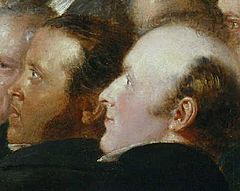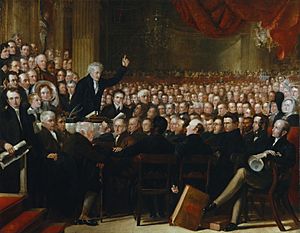John Scoble facts for kids
Quick facts for kids
John Scoble
|
|
|---|---|

To the left is William Knibb and to the right John Scoble - 1840
|
|
| Born | January 16, 1799 |
| Died | November 11, 1877 Hamilton, Ontario, Canada
|
John Scoble (born January 16, 1799 – died November 11, 1877) was an important person who worked to end slavery. He was a minister and a political leader in Canada. He spent much of his life fighting for freedom and fairness for all people.
Contents
Early Life and Anti-Slavery Work
John Scoble was born in Kingsbridge, England in 1799. He went to school in Devon and London.
He became a strong supporter of the movement to end slavery. After slavery was officially ended in the West Indies, a new system called "apprenticeship" was put in place. This system still forced people to work without full freedom. Scoble joined protests against it.
In 1837, a man named Joseph Sturge organized a trip to the West Indies. He invited Scoble and others to report on how the apprenticeship system was really working. Scoble focused on reporting from British Guiana.
This trip helped show how unfair the system was. It led to books and speeches that helped end the apprenticeship system completely.
Fighting for Freedom
Scoble also worked against the "indenture" system. This system forced workers, often from Asia, to work on plantations for a set time, often in very poor conditions. He wrote reports about their struggles.
He was a key person in forming the British and Foreign Anti-Slavery Society. He worked as the secretary for this important group from 1842 to 1852. This society worked to end slavery and forced labor around the world.
Scoble also helped restart the anti-slavery movement in France. He wrote to people like François-André Isambert, who worked hard to free French slaves.
Life in Canada
In 1852, John Scoble moved to Upper Canada (which is now part of Ontario). He wanted to help the British-American Institute, a special school for Black people. This school was run by Josiah Henson, a former enslaved person who had escaped to freedom.
Scoble tried to help the school with its money problems. However, he had disagreements with the school's leaders and with Josiah Henson. This made it hard for him to fix the school's finances.
Helping Enslaved People
In 1860, Scoble played a big part in stopping John Anderson from being sent back to the United States. Anderson was an enslaved person who had escaped from Missouri. He was accused of murder. Scoble's help meant Anderson could stay free in Canada.
In 1861, Scoble left the school's board. Eventually, the school's land was sold. The money from the sale was used to create a school in Chatham that welcomed all students, no matter their background.
Political Career
John Scoble became a politician in Canada. He was elected to the Legislative Assembly of the Province of Canada in 1863, representing West Elgin. He was re-elected later that same year.
In politics, he believed in a system where different parts of Canada had more control over their own areas. This is called a decentralized federation. He also supported "representation by population," meaning that areas with more people should have more representatives in government. Even though he wanted reforms, he supported the leader John A. Macdonald.
Scoble left politics in 1867 after he was not re-elected. He passed away in Ontario in November 1877, at the age of 79.
Published Works
John Scoble wrote several books and reports about his anti-slavery work:
- British Guiana, London, 1838
- Texas: its claims to be recognized as an independent power, by Great Britain, London, 1839
- Hill coolies; a brief exposition of the deplorable condition of the hill coolies in British Guiana and Mauritius, London, 1840
- Liberté immédiate et absolue, ou esclavage (Immediate and Absolute Freedom, or Slavery), Paris, 1844 (with G. W. Alexander)
- He also wrote the introduction to Lewis Tappan's Reply to charges brought against the American and Foreign Anti-Slavery Society (London, 1852).
- He published many articles in the Anti-Slavery Reporter.
 | Janet Taylor Pickett |
 | Synthia Saint James |
 | Howardena Pindell |
 | Faith Ringgold |


